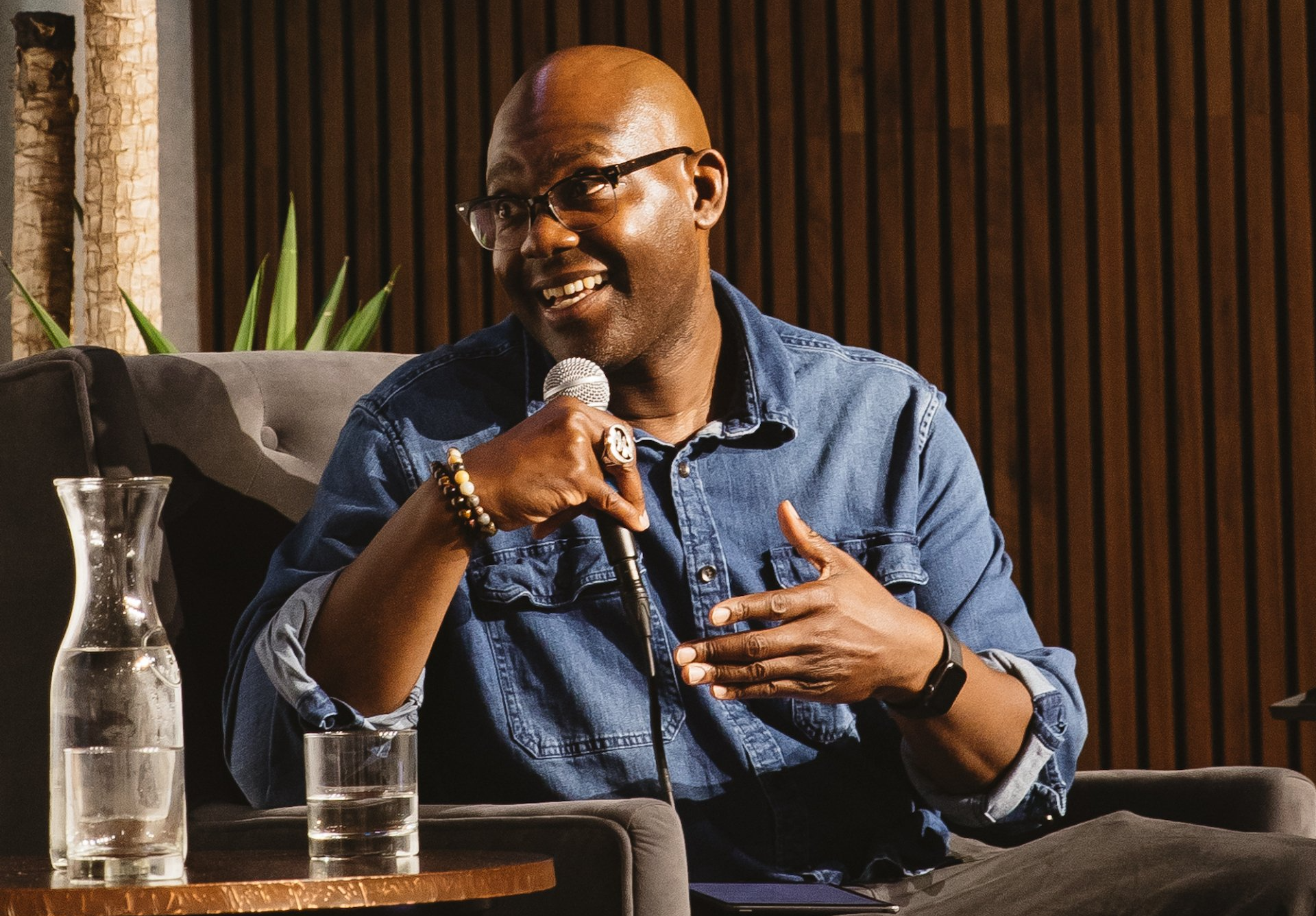In the Nō with Dr. Donte McFadden (of Black Lens)

Donte McFadden, photographed by SHOTBYBASI
Born and raised in Milwaukee, Donte McFadden is the Senior Associate Director for Undergraduate Research and High Impact Practices for the Educational Opportunity Program at Marquette University. His primary role is serving as the Director of the Ronald E. McNair Post baccalaureate Achievement Program. Dr. McFadden obtained his PhD in English with an emphasis in Film Studies from University of Wisconsin-Milwaukee in August of 2013. Since 2014, he has been a Programmer for the Black Lens Program as part of the Milwaukee Film Festival. Black Lens showcases new and classic films by African American filmmakers, and 2022 marks its ninth year.
We spoke with Donte McFadden about the importance of Black History Month and all of the programming MKE Film and Black have planned for the month. We're happy to say the programming kicks off with The Creative Collective: A Film Showcase, Panel Discussion, + Networking Experience at Nō Studios, taking place Tuesday, February 1st from 6-8pm
Learn more about the event and MKE Film's full slate of programming here.
—
Nō Studios : Can you tell me a little bit about what Milwaukee film and Black Lens have planned for Black History Month this year?
Donte McFadden: So for Black History Month, Milwaukee Film and Black Lens, we have a slate of screenings and events that will take place throughout the entire month of February. In terms of events, we kick it off with what we're calling the Creative Collective panel discussion and networking mixer. For the panel discussion, we have reached out to people who are emerging artists, creatives and entrepreneurs — and they'll be talking about the sources for their creativity, how they establish themselves as entrepreneurs. The panelists will include Nyesha Stone, she's the founder of Carvd N Stone and an emerging filmmaker; Michael Harris of MKE Expanded; Marquise Mays, who's a filmmaker — some people may be familiar with his film the heartland; and the conversation will be moderated by Lexi Brunson, Editor in Chief of Copywrite Magazine. And then we'll have some networking activities and music provided by DJ Lolo.
Another event that we will have is what we're calling the honest truth, and this will coincide with our Black Love through a Black Lens shorts program. It is a conversation between reality TV star Sheila Marie (featured on VH1's Love and Hip Hop) and Dr. Kirsten Warner, who is a professor at University of Alabama who specializes in communications in media. They're going to talk about the depiction of love and relationships among Black people.
Additionally, we're going to have an 80s and 90s Black Movie Trivia Night — and this is just one of those events where we want to have some fun activities. So while we think that the Creative Collective panel will be a good time, while we think the Honest Truth conversation will be a good time, you know, this will be a friendly competition among people to talk about, some of their favorite movies from the 80s and 90s that are either from Black directors or with a predominantly Black cast, and we're going to, they're going to compete to see who knows the most about it.
Lastly, we're going to have a reception following the screening of Sankofa at America's Black Holocaust Museum, that will be part of their opening weekend.
And how about the films? Of course that' a big part of the programming as well.
So as far as the film's we are going to begin with the film Zola. It's directed by Janicza Bravo and was originally released in 2020, at the Sundance Film Festival. It kind of flew under the radar and what Milwaukee film, whether it's to our festivals, whether it's to our year round programming, whether it's to our staff picks, or any kind of special programming that we have — if there's a film that we love, and that not enough people have seen, we usually try to create the excuse to do so. I think that was the case with Zola. It's about a young black woman who was encountered by a young white woman to go to different parts of the country to dance at some clubs and earn some money, but little does this young black woman know, she's being lured into a human trafficking ring. The story is told through the eyes of a Black woman by a Black woman director.
We're also going to show the documentary, The One and Only Dick Gregory, that features the life and career of the comedian and activist. I think it's an important overview of a public figure who gave so much not only through entertainment, but what he offered for communities of color, particularly Black communities. As well, we'll have a shorts program, Black Love Through a Black Lens. This is a collection of six short films by Black Filmmakers exploring the topics of love, relationships, and self-worth in terms of identifying themselves as Black people.
Additionally, we'll show Citizen Ashe — a documentary about the life and legacy of tennis player and activist Arthur Ashe. Lastly we'll be showing the film Who We Are: A Chronicle of Racism in America. This film was initially shown during the 2021 Milwaukee film festival as a virtual offering, and its distributor is now distributing the film nationwide. It's exciting to have Milwaukee Film, Black Lens in particular, show this film as part of the theatrical run at the Oriental theater. It's a very intricate examination about race relations in racism throughout the existence of the United States by Jeffery Robinson. Interspersed with this talk that he gives are moments where he goes to different parts of the country to look at, you know, some of the monuments, look at some of the ways in which people are upholding of legacies of histories that reflect acts of racism. It's interspersed, you know, within his talk, how he's responding to these moments personally — and I think it's heart-wrenching. I think it's engaging, and I think it's very informative. Not in the sense that people are feeling lectured to, but it will compel people to recognize why is it important to not only know, but to confront the history of race and racism in America.
We're also having a short program called Family Matters, the first time Black Lens has created a short program that is dedicated to audiences between the ages of eight to 18. These are going to be some short films that the entire family can come and enjoy.
We're also going to show the film the Loyola project, this is a documentary about the Loyola Chicago basketball team. Back in 1963, this was the first team to win the NCAA championship with a starting five that was primarily Black. The film that will be showing after that is Sankofa, a 1993 film about a model who is on a photoshoot on the Cape Coast castles of Ghana, where the Door of No Return is located. That's where enslaved Africans were placed on ships and sent to various parts of the world. While she's on the shoot, she is transported from where she is in Ghana, to the period of antebellum slavery in America, where she witnesses firsthand the brutality of slavery, and also the importance for enslaved Africans to create community, to support one another, and to instill the sense of resiliency and resistance in one another. So that's pretty much Black History Month in a nutshell.
"At what point was there going to be a turning point that this country would be honest about tackling racism and improving race relations? In what ways has that regression taken place?"
How were the four guiding themes — Black Perspectives, Black Love Through a Black Lens, Black Genealogies, and Black Remembrances — for the programing decided?
So usually, there's about one or two films in the week that were the guiding force for how we created each theme. With Black Perspectives. I think having the Creative Collective panel, obviously, you're getting a variety of perspectives of local creatives. And then in addition to that, Zola, being this absurd comic take, you know, about a topic of serious human trafficking motivated creating the theme of black perspectives, just presenting the breadth and depth of black experiences.
Then Black Love Through a Black Lens, much of this coincides around the time of Valentine's Day. For the last three years, when we've done programming for Black History Month we've always wanted to find short films that offer engaging and interesting explorations of, what it means to be in love. What does it mean to love yourself? And also, given the conversation that will take place between Sheila Murray and Dr. Kristen Warner, that's got to be an exciting conversation in and of itself to see from what vantage points they come from and what kind of insights they offer to that topic.
Black Genealogies, you know, that was motivated largely by the fact that Who We Are: A Chronicle of Racism in America is the film on that is featured that week. It's a genealogy of racism and race, particularly the existence of people of color — notably Black people in America. It's just pretty much getting down to the heart of how did things get to be the way that they are? At what point was there going to be a turning point that this country would be honest about tackling racism and improving race relations? In in what ways has that regression taken place?
Black Remembrance is mainly guided by the film Sankofa, given the theme of the film is to revisit one's past to understand the sacrifices that one's ancestors had to give in order to create a better life for someone else. Now, in the case of Sankofa we're talking about Africans who are demonstrating resistance, and resiliency in the face of enslavement — the sacrifices were not voluntary. The lead character in the film, she has to see this firsthand, you know, to understand that what may appear to be a backdrop for a photoshoot actually has a much deeper history that directly connects to her than she thinks. Also, in terms of Black remembrance, the fact that we're talking about The Loyola Project and we're looking at sports as a gateway into looking at race relations in America, I think is also important. Notably, tied to the sense of remembrance from a local standpoint, the reopening of America's Black Holocaust Museum is really important to the city of Milwaukee. It's important to this country, and Back Lens is honored to have the screening of Sankofa coincide with the grand reopening of the museum, and we're honored to be partnering with their efforts.

America's Black Holocaust Museum, located in Milwaukee's Brewer's Hill neighborhood
That all sounds amazing. Is there a film that you're personally especially excited to be screening in the lineup?
So I do have a couple. As a programmer for Black Lens, I certainly want to have a balance of films that will attract people to the theatre, simply because it's a familiar topic, or there's probably a filmmaker or an actor that someone is familiar with. But I also like to present films that may challenge an audience in how they engage with cinematic storytelling. Some people may want a linear way of how a story is told on screen, and there's some filmmakers that we bring into the Black Lens programming, whether it's for the festival or for year-round programming, that challenge that.
I think two films that are welcome challenges to the audience that we're bringing for Black History Month are Zola — which, like I said is this is absurdist comic comedy that's from the perspective of a black woman from a black woman director. I think it's really interesting and I'm just curious to see how audiences respond to that. And then Sankofa is also something that I'm looking forward to people to seeing. This is, I have to say one of the most unflinching depictions of slavery presented on screen. Haile Karima has a lasting legacy as a filmmaker with uncompromising vision of how he wants to tell stories of Black people on screen from all parts of the world, and Sankofa is a central part of that legacy. I think, as he would put it, this is not a film about slavery as much as it is a documentation of the resilience and resistance of people of African descent. It's really exciting that I'm able to put together a program and showcase the work of someone whose work I followed closely for decades.

Sankofa (1993). Written by Haile Gerima
"I think, as [Haile Gerima] would put it, this is not a film about slavery as much as it is a documentation of the resilience and resistance of people of African descent."
What do you hope that attendees and the city of Milwaukee as a whole will take away from this month long celebration and programming?
I hope they take away a few things. One, I hope they come to see this as a kickoff for the kind of programming that Black Lens is going to be doing throughout 2022, and that it really gets audiences to think of ways in which the work of Black filmmakers are being showcased, not just in the month of February, but throughout the year. I think it also presents some how there is quality Black History Month programming being presented in the city. Myself and my colleagues in Milwaukee film, we put a lot of heart and soul into creating screenings in events that people will find engaging and will be quite excited about. Not only will they learn something, but they also have an edifying experience.
Another takeaway that I hope people get from Black History Month with this program is that it also gets them excited about supporting Black creatives and Black institutions here in Milwaukee. I think The Creative Collective panel is the kind of work that Black Lens has long been doing in terms of highlighting what people are doing in the city. I think it's also quite poetic, for lack of a better word, that within our Black History Month programming we have the opening of a local treasure, America's Black Holocaust Museum. I hope people get is not only are they learning more about the work local people are doing through their artwork and through the institutions they provide for the city, but, through Black Lens, they see that we're building partnerships with these people, and this is something that they should look out for throughout 2022.
Click
here to learn more about MKE Film's Black Lens Black History Month programming.












